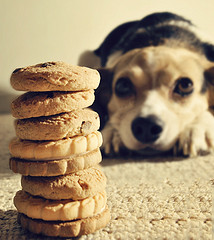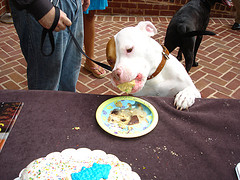Barks Blog
In Defense Of Treats–And The Dogs Who Love Them
“My dog will do anything as long as there are treats.” Don’t dog owners say this all the time? Often the tone is light, with a grin and a “that’s a dog for you” wink. But sometimes it’s got an undertone, an edge. Some owners wonder why their dog won’t act a certain way or do a specific behavior just because they said so, or just to please them. They may chafe at “paying” for behavior they think they deserve for free. What I call food-motivated, an asset in training, they see as greedy, even mercenary. Why are we so conflicted about how we reward our dogs?

Link to license below.
Let’s unpack this thing together. We’re going to take a look at our own relationship with food as a reward and motivator. We’ll peer into what motivates our dogs to do what they do, how we get them to do what we want instead, and how food figures into that calculus. And we’ll reframe the issue by looking at dogs’ hard-wired preference to earn their food rather than receive it without effort.
Congratulations, Thank You, Good Job: Have A Cookie!
So dogs are motivated by treats? Guess what? So am I! Aren’t you? Yes, I will also do things out of the goodness of my heart, or since I like you, or because I’m supposed to. But if you ask me to drive you somewhere, and you get into my car and tear open a big ol’ bag of peanut M&Ms, I’ll be even more willing to drive you the next time.
When eating is so central to our lifestyle, and most of us find it so exquisitely pleasurable, why do we hold it against our dogs when they’re excited by treats? And don’t we reward each other–and ourselves–with food all the time? We take our kids out for ice cream when they win their soccer game. We bring donuts to our early morning meetings to lighten the mood and sweeten the deal. We thank someone for a favor with a batch of chocolate chip cookies. And after a hard workout, don’t we deserve a little (or big!) dessert? So why do we fault our dogs for licking their chops over an itty bitty speck of chicken?
Dogs Will Be Dogs–Unless…
If you think about it, we ask for some pretty un-dog-like behavior from our dogs, don’t we? For example “come”, “stay”, “drop it” and “leave it” don’t come naturally to dogs the way “sit” or “down” might. In fact, they violate a dog’s core values! Left to their own devices, most dogs would operate freely on their environment, going where they want, returning when they please, and helping themselves to whatever they could find. To do otherwise, on cue, requires almost monk-like self discipline. Spit out that chicken bone instead of eating it? Don’t chase the cat? Quit rolling in that raccoon carcass and come inside? If we want our dogs to walk away from the things they love, we’ll need a trade-off better than a pat on the head and a “good boy” to reward their sacrifice (!) and motivate them for the next time.

link to license below.
If I say “leave it” to my dog Huckleberry when one of my free-range rabbits darts past her, she’ll put on the brakes and watch me until I say “yes!”–and then trot over to the fridge for a little cube of ham. We built up to this by degrees; it didn’t happen overnight. But it wouldn’t have worked at all without a reward that was worth more to her than the chase. For her, ham is that high-value trade-off. My predator will CHOOSE to stop dead in her tracks and abandon her prey for one tiny morsel of cheap lunch meat. In the grand scheme of things, isn’t that a small price to pay?
What’s Better Than Hand Licking And Butt Sniffing?
For the group training classes I teach, I ask clients to bring high-value treats, and LOTS of them, to compete with the distracting environment. Some do as suggested, laying on a lavish buffet of string cheese, hot dogs and roast beef for their dogs. Others are doubters. They show up with Milk Bones or kibble and wonder why their dogs are ignoring them. Well, let’s think about this.
Yes, training is fun for our dogs, but to some degree it’s also work. It’s mentally taxing. Sometimes they mess up and disappoint you–and they feel it. And there’s the opportunity cost–if they’re paying attention to you, they’re missing all the excitement going on around them. The truth is, I can’t really force my dog to practice the exercises with me; I need her to want to do them. She needs to want that more than she wants to wander around the classroom casing the joint, sniffing other dogs’ butts, and licking people’s hands. If all it takes is a few itty bitty chunks of cheese for our dogs to choose training over all those other entertainment options, I’d call that a bargain.
Freeloading Is No Fun
Dogs are hard-wired to work for their food–to hunt, forage, scavenge, problem-solve, and perform tasks in order to earn what they eat. This is a phenomenon first described by animal behavior scientist Glen Jensen, who called it “contrafreeloading”. Countless studies by Jensen and others of species ranging from chimps to gerbils to fish (and yes, dogs) demonstrate that, given the choice between easy-access food and food that requires effort, animals will pick the challenge. The challenge itself is reinforcing.

link to license below.
So for dogs, performing behaviors and tricks isn’t just a means to an end, i.e. a food reward. The effort involved is also rewarding. So let’s turn dog owners’ “my dog only works for treats” lament on its ear. Instead they could boast, “My dog loves to work for food”. See the difference? And I’m not just talking about hot dogs and meatballs here. DO try this at home: Dogs would rather work for their dinner than have it handed to them in a bowl.
How do you reward your dog–or yourself or your kids? Does your dog work for food? What examples of contrafreeloading have you seen in your life with dogs and other animals?
For further reading:
Can A Dog Be Too Food Motivated?: https://www.lolathepitty.com/can-a-dog-be-too-food-motivated
The Joy of Working: https://www.forbes.com/2010/05/28/dan-ariely-irratioanlity-excerpt-opinions-ariely-book.html
Images used under Creative Commons license: https://creativecommons.org/licenses/by/4.0/legalcode

